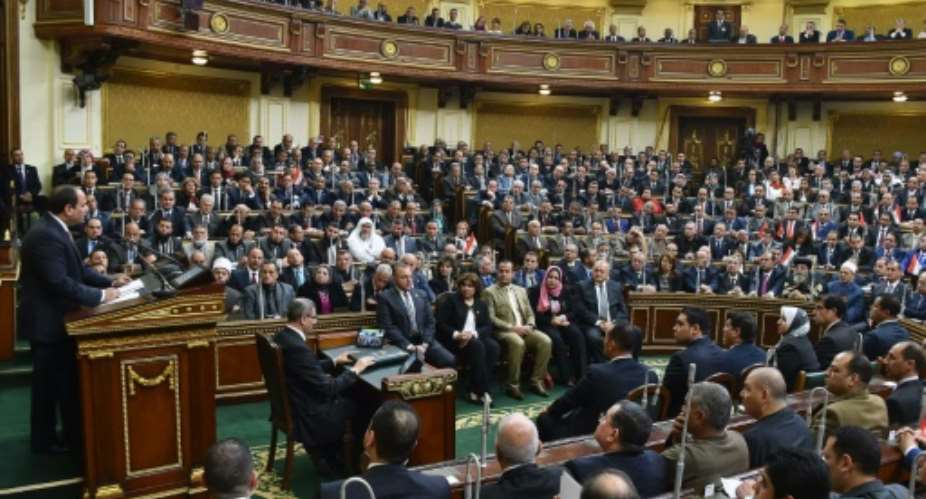Cairo (AFP) - When Egypt's parliament passed a hard-fought civil service law last week, it was seen as a rare outbreak of resistance to President Abdel Fattah al-Sisi.
The final, amended draft made it harder to fire members of the country's bloated bureaucracy, which Sisi has suggested should be trimmed down.
But such defiance has been an exception to what critics call the rubber-stamp role parliament has assumed since its election in 2015.
"The parliament spent most of its time approving legislation by the government in the form that the government wants," said Ahmed al-Tantawi, a member of the "25-30" grouping of lawmakers that has opposed several bills.
Its election, following a referendum on the constitution and a presidential vote, was hailed by Sisi as the third milestone in a democratic roadmap after the military, led by Sisi himself, toppled Islamist president Mohamed Morsi in 2013.
The 2014 constitution granted parliament extensive powers, including impeaching the president and a confidence vote on the prime minister.
It was an uneasy arrangement for Sisi, who has tolerated little dissent, saying the country needs to get back on its feet after years of unrest pummelled the economy.
As it turned out, he has been able to count on parliament's support.
When a lawmaker inquired in late July about whether pensions were still going to retired military officers who assumed senior positions in industry and state institutions, parliament speaker Ali Abdel Aal shouted him down.
"This talk is over," Abdel Aal yelled at the parliamentarian, Mohamed Anwar Sadat, saying such mention of the military was inappropriate.
From the start, experts had warned the parliament's structure would produce a weak and divided legislature.
The vast majority of elected members of the 596-seat parliament were independent candidates, with only 20 percent from coalition lists.
The legislature is dominated by a coalition of pro-government individuals and parties while the main opposition, Morsi's Muslim Brotherhood, has been banned.
With Egypt running without a legislature since June 2012, parliament, elected in October last year, had to review more than 300 laws issued by Sisi and Adly Mansour, the interim president after Morsi.
Many parliamentarians "believe that if you oppose the regime, then you oppose the state," said Amr Hashem Rabie, a political researcher at Al-Ahram Center for Political and Strategic Studies.
'Agree on everything'
The only coalition in the parliament, of which Abdel Aal is a member, is the pro-government "Support Egypt" bloc.
"The government got everything it wanted from the parliament," Mohamed Zakareya Mohyeldin, an independent lawmaker, told AFP.
"The majority of Support Egypt agree on everything."
When it came to discussing the annual budget, "the parliament was more than just a rubber stamp... It also offered excuses," says Salma Hussein, a researcher with the Egyptian Initiative for Personal Rights.
EIPR says the budget ending July 2017 did not meet constitutional spending requirements on education, health, and scientific research, totalling 10 percent of gross national product.
Spending on these areas was estimated to be 97.4 billion pounds ($11 billion) less than required by the constitution, EIPR said in July.
The Planning and Budget committee had said the requirements were met when they included in their calculations the servicing of loans previously spent on those sectors.
The budget "was an opportunity because the constitution obligates you with it, so you should have held on to the constitution and told the government to abide by it. So it's a lost opportunity."
Abdel Aal has warned members who criticise monetary policy, or who participate in workshops by foreign agencies that he said may be working against Egypt.
Sadat says he resigned from heading the human rights committee after several relevant laws bypassed the committee.
They included a law that bans all but police-sanctioned protests, a law that critics say constricts the work of civil society groups, and a law that organises church-building.
But MP Mohamed Hasan Madina defended the house's performance, saying it gets the job done.
"The parliament has achieved in the first session what previous parliaments could in five years," he said.
"It passed some important and pressing laws."





 Tuesday’s downpour destroys ceiling of Circuit Court '8' in Accra
Tuesday’s downpour destroys ceiling of Circuit Court '8' in Accra
 SOEs shouldn't compromise on ethical standards, accountability – Akufo-Addo
SOEs shouldn't compromise on ethical standards, accountability – Akufo-Addo
 Father of 2-year-old boy attacked by dog appeals for financial support
Father of 2-year-old boy attacked by dog appeals for financial support
 Jubilee House National Security Operative allegedly swindles businessman over sa...
Jubilee House National Security Operative allegedly swindles businessman over sa...
 Nobody can order dumsor timetable except Energy Minister – Osafo-Maafo
Nobody can order dumsor timetable except Energy Minister – Osafo-Maafo
 Mahama wishes National Chief Imam as he clock 105 years today
Mahama wishes National Chief Imam as he clock 105 years today
 J.B.Danquah Adu’s murder trial: Case adjourned to April 29
J.B.Danquah Adu’s murder trial: Case adjourned to April 29
 High Court issues arrest warrant for former MASLOC Boss
High Court issues arrest warrant for former MASLOC Boss
 Align academic curriculum with industry needs — Stanbic Bank Ghana CEO advocates
Align academic curriculum with industry needs — Stanbic Bank Ghana CEO advocates
 Election 2024: We'll declare the results and let Ghanaians know we've won - Manh...
Election 2024: We'll declare the results and let Ghanaians know we've won - Manh...
